
Afghanistan, officially the Islamic Emirate of Afghanistan, is a landlocked country located at the crossroads of Central and South Asia. Referred to as the Heart of Asia, it is bordered by Pakistan to the east and south, Iran to the west, Turkmenistan to the northwest, Uzbekistan to the north, Tajikistan to the northeast, and China to the northeast and east. Occupying 652,864 square kilometers (252,072 sq mi) of land, the country is predominantly mountainous with plains in the north and the southwest, which are separated by the Hindu Kush mountain range. As of 2021, its population is 40.2 million, composed mostly of ethnic Pashtuns, Tajiks, Hazaras, and Uzbeks. Kabul is the country's largest city and serves as its capital.

The Taliban, which also refers to itself by the name of its state, the Islamic Emirate of Afghanistan, is a Deobandi Islamic fundamentalist, militant Islamist, and jihadist political movement in Afghanistan. It ruled approximately three-quarters of the country from 1996–2001, before being overthrown following the United States invasion. It recaptured Kabul on 15 August 2021 after years of insurgency, and currently controls all of the country, although its government is not recognized by any country yet. The Taliban government has been criticized for restricting human rights in Afghanistan, including the right of women and girls to work and education.
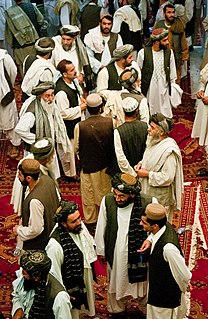
Pashtuns, also called Pakhtuns or Pathans and historically known as Afghans, are an Iranian ethnic group who are native to Central Asia and South Asia. Pashtuns are the 26th-largest ethnic group in the world, and the largest segmentary lineage society. There are an estimated 350–400 Pashtun tribes and clans with a variety of origin theories.

Mohammad Ashraf Ghani Ahmadzai is an Afghan politician, academic, and economist who served as the fifth president of Afghanistan and the second and final president of the Islamic Republic of Afghanistan from September 2014 until August 2021, when his government was overthrown by the Taliban.

Helmand, also known as Hillmand, in ancient times, as Hermand and Hethumand, is one of the 34 provinces of Afghanistan, in the south of the country. It is the largest province by area, covering 58,584 square kilometres (20,000 sq mi) area. Also, geographically and politically it is known as one of the important provinces in Afghanistan specially for Taliban because its climate is suitable for the cultivation of a wide range of crops, including the opium that contributes greatly to the Taliban's finances. The province contains 13 districts, encompassing over 1,000 villages, and roughly 1,446,230 settled people. Lashkargah serves as the provincial capital.

The Second Anglo-Afghan War was a military conflict fought between the British Raj and the Emirate of Afghanistan from 1878 to 1880, when the latter was ruled by Sher Ali Khan of the Barakzai dynasty, the son of former Emir Dost Mohammad Khan. The war was part of the Great Game between the British and Russian empires.

Ghazi Amanullah Khan was the sovereign of Afghanistan from 1919, first as Emir and after 1926 as King, until his abdication in 1929. After the end of the Third Anglo-Afghan War in August 1919, Afghanistan was able to relinquish its protected state status to proclaim independence and pursue an independent foreign policy free from the influence of the United Kingdom.

Dr. Habiba Sarābi is a hematologist, politician, and reformer of the post-Taliban reconstruction of Afghanistan. In 2005, she was appointed as Governor of Bamyan Province by President Hamid Karzai, which made her the first Afghan woman to become a governor of any province in the country. She previously served as Afghanistan's Minister of Women's Affairs as well as Minister of Culture and Education. Sarabi has been instrumental in promoting women's rights and representation and environment issues. She belongs to the ethnic Hazara people of Afghanistan. Her last name is sometimes spelled Sarobi.

The Sur Empire was an Afghan dynasty which ruled a large territory in the northern part of the Indian subcontinent for nearly 16 years, between 1540 and 1556, with Sasaram, in modern-day Bihar, serving as its capital. It is sometimes called the "Second Indo-Afghan Empire".

Malalai Joya is an activist, writer, and a politician from Afghanistan. She served as a Parliamentarian in the National Assembly of Afghanistan from 2005 until early 2007, after being dismissed for publicly denouncing the presence of warlords and war criminals in the Afghan Parliament. She was an outspoken critic of the Karzai administration and its western supporters, particularly the United States.

Naghma Shaperai is an Afghan singer who started her career in the early 1980s. She sung along her ex-husband, Mangal, during the 1980s and early 1990s. Naghma sings mostly in Pashto, but has also recorded in the Dari Persian language. She is considered to be folklore female artist in Afghanistan and continues to be the voice and face of Pashtun traditional music.

The Emirate of Afghanistan also referred to as the Emirate of Kabul was an emirate between Central Asia and South Asia that is now today's Afghanistan and some parts of today's Pakistan. The emirate emerged from the Durrani Empire, when Dost Mohammad Khan, the founder of the Barakzai dynasty in Kabul, prevailed.

Women's rights in Afghanistan have oscillated back and forth depending on the time period. After King Amanullah Khan's attempts to modernize the country in the 1920s, women officially gained equality under the 1964 Constitution. However, these rights were taken away in the 1990s through different temporary rulers such as the mujahideen and the Taliban during the Afghan civil war. During the first Taliban regime (1996–2001), women had very little to no freedom, specifically in terms of civil liberties. When the Taliban were removed from power following the 9/11 attacks in the United States, women's rights gradually improved under the presidential Islamic Republic of Afghanistan. Women were de jure equal to men under the 2004 Constitution.
Malalai of MaiwandPashto pronunciation: [malɑˈləi], also known as Malala, or Malalai Anna is a national folk hero of Afghanistan who rallied Pashtun fighters during the Battle of Maiwand. She fought alongside Ayub Khan and was responsible for the Afghan victory at the Battle of Maiwand on 27 July 1880, during the Second Anglo-Afghan War. She is also known as "The Afghan Jeanne d'Arc" or as "The Afghan Molly Pitcher" to the Western world. There are many schools, hospitals, and other institutions named after her in Afghanistan. Her story is told in the Afghan school text books.
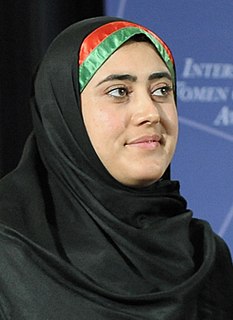
Maryam Durani is an Afghan activist and women's advocate. In 2012 she received the International Women of Courage Award.
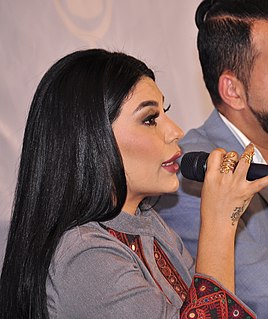
Aryana Sayeed is an Afghan singer, songwriter and TV personality. She sings mostly in Dari but also has many songs in Pashto and some in Uzbek. She is one of Afghanistan's most famous musical artists, performing regularly in concerts and philanthropic festivals within and outside Afghanistan. Sayeed has also had hosting roles in musical television shows for the 1TV and TOLO network along with appearances on reality shows.
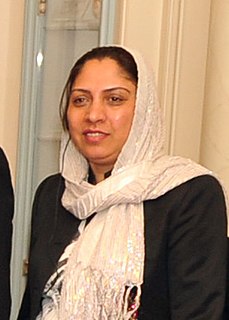
Shafiqa Quraishi is an Afghan women's rights activist. As of 2010 she is a police colonel and the director of Gender, Human and Child Rights within the Ministry of the Interior of Afghanistan. She founded and led a working group on the Afghan National Gender Recruitment Strategy, with the goal of getting 5,000 women to work in the Ministry of the Interior and making the Ministry of the Interior better at serving the women of Afghanistan. She also worked for more benefits for working women such as child care, health care, maternity care, security and skills training. She managed to obtain promotions for women working in the Afghan National Police who had been unfairly passed over for years. As of 2011 she is Afghanistan's most senior policewoman.
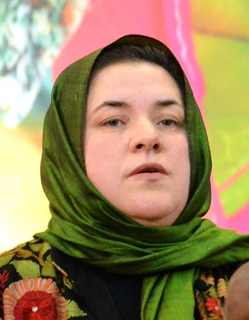
Nisrin Hader(2007) is an Afghan minister, gynecologist and obstetrician. She won awards for her work and in 2015 she was made a minister.
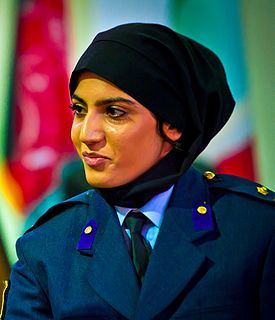
Niloofar Rahmani is the first female fixed-wing Air Force aviator in Afghanistan's history and the first female pilot in the Afghan Air Force since the fall of the Taliban in 2001. Though her family received death threats, she persevered to complete her training and won the U.S. State Department's International Women of Courage Award in 2015.

Zarifa Ghafari is an Afghan activist and politician. In November 2019, she became the mayor of Maidan Shahr, capital city of the Wardak Province, Afghanistan. Zarifa used to be one of the few Afghan female mayors, and was also the youngest to be appointed, at the age of 26. She is known for her efforts to advance women's rights in Afghanistan. Zarifa was chosen as an International Woman of Courage in 2020 by the US Secretary of State. She has survived three assassination attempts.


















